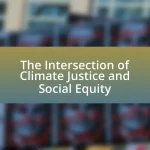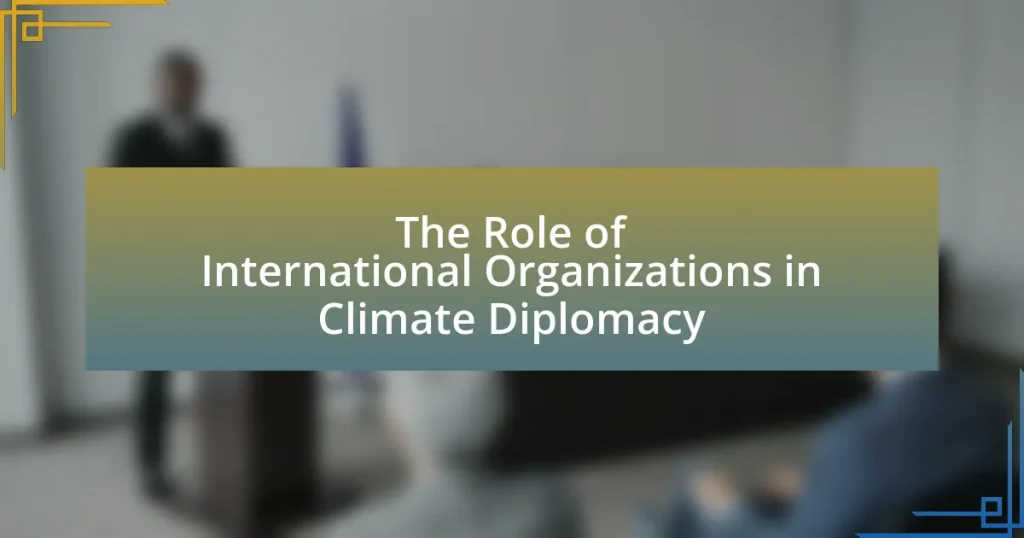International organizations, such as the United Nations Framework Convention on Climate Change (UNFCCC), play a vital role in climate diplomacy by facilitating negotiations, establishing international standards, and promoting cooperation among nations. They provide platforms for discussions, offer technical and financial support to developing countries, and help monitor progress in climate initiatives. The article explores how these organizations influence global climate policy, the challenges they face, and the mechanisms they employ to encourage compliance and enhance climate action effectiveness. It also highlights the importance of partnerships with non-state actors and best practices for successful climate diplomacy.
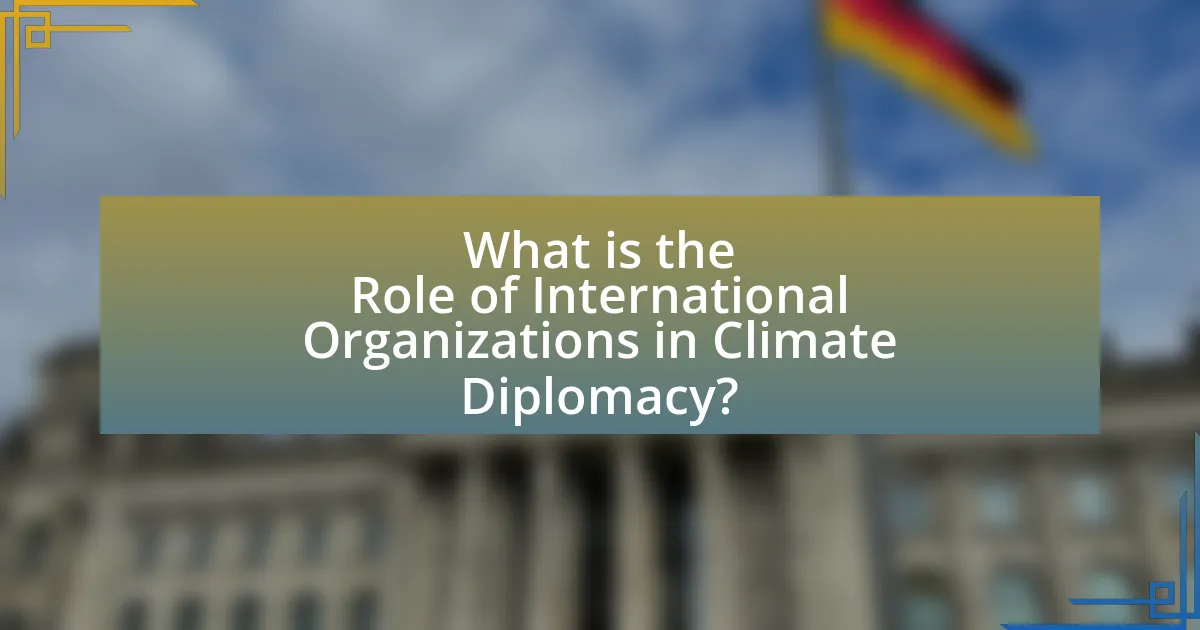
What is the Role of International Organizations in Climate Diplomacy?
International organizations play a crucial role in climate diplomacy by facilitating negotiations, setting international standards, and promoting cooperation among countries. They provide platforms, such as the United Nations Framework Convention on Climate Change (UNFCCC), where nations can discuss and commit to climate action. These organizations also offer technical assistance and financial resources to support developing countries in their climate initiatives, exemplified by the Green Climate Fund, which aims to assist vulnerable nations in adapting to climate change. Furthermore, international organizations help to monitor and report on progress, ensuring accountability and transparency in global climate efforts.
How do international organizations influence climate policy globally?
International organizations influence climate policy globally by facilitating cooperation among nations, providing scientific research, and establishing frameworks for climate agreements. For instance, the United Nations Framework Convention on Climate Change (UNFCCC) plays a crucial role in bringing countries together to negotiate and implement climate action plans, such as the Paris Agreement, which aims to limit global warming to well below 2 degrees Celsius. Additionally, organizations like the World Bank and the International Monetary Fund offer financial resources and technical assistance to developing countries, enabling them to adopt sustainable practices and reduce greenhouse gas emissions. These efforts are supported by data indicating that countries participating in international agreements are more likely to meet their climate targets compared to those that do not engage in such frameworks.
What are the key functions of international organizations in climate diplomacy?
International organizations play crucial roles in climate diplomacy by facilitating negotiations, providing scientific expertise, and promoting international cooperation. They serve as platforms for countries to discuss and agree on climate policies, exemplified by the United Nations Framework Convention on Climate Change (UNFCCC), which has been instrumental in shaping global climate agreements like the Paris Agreement. Additionally, these organizations offer technical and financial support to developing nations, enabling them to implement climate action effectively. For instance, the Green Climate Fund, established under the UNFCCC, aims to assist developing countries in reducing greenhouse gas emissions and adapting to climate change. Through these functions, international organizations enhance global efforts to combat climate change and foster sustainable development.
How do these organizations facilitate international cooperation on climate issues?
International organizations facilitate international cooperation on climate issues by providing platforms for negotiation, establishing frameworks for collaboration, and promoting the sharing of best practices among nations. For instance, the United Nations Framework Convention on Climate Change (UNFCCC) organizes annual Conferences of the Parties (COP), where countries negotiate binding agreements like the Paris Agreement, which aims to limit global warming to well below 2 degrees Celsius. Additionally, organizations like the World Bank and the International Monetary Fund offer financial resources and technical assistance to developing countries, enabling them to implement climate adaptation and mitigation strategies effectively. These collaborative efforts are essential for aligning global policies and mobilizing resources to address climate change collectively.
Why is climate diplomacy important for international organizations?
Climate diplomacy is crucial for international organizations because it facilitates global cooperation to address climate change, which is a transboundary issue requiring collective action. International organizations, such as the United Nations, play a pivotal role in negotiating agreements like the Paris Agreement, which aims to limit global warming to well below 2 degrees Celsius. These organizations provide a platform for countries to share knowledge, resources, and best practices, thereby enhancing the effectiveness of climate policies. Furthermore, they help to mobilize financial resources and technical support for developing nations, ensuring that all countries can participate in climate action. The effectiveness of climate diplomacy is evidenced by the establishment of frameworks that have led to significant commitments from nations to reduce greenhouse gas emissions, demonstrating the importance of international collaboration in tackling climate challenges.
What challenges do international organizations face in climate diplomacy?
International organizations face significant challenges in climate diplomacy, primarily due to conflicting national interests and varying levels of commitment to climate action among member states. These organizations, such as the United Nations Framework Convention on Climate Change (UNFCCC), often struggle to achieve consensus on binding agreements, as countries prioritize their economic growth and energy needs over environmental concerns. For instance, the 2015 Paris Agreement highlighted the difficulty of reconciling developed nations’ demands for emissions reductions with developing nations’ needs for economic development and poverty alleviation. Additionally, the lack of enforcement mechanisms for climate agreements further complicates compliance, as seen in the limited progress made by countries that have pledged to reduce greenhouse gas emissions but fail to meet their targets.
How do international organizations address these challenges?
International organizations address climate diplomacy challenges by facilitating negotiations, providing scientific data, and promoting collaborative frameworks among nations. For instance, the United Nations Framework Convention on Climate Change (UNFCCC) organizes annual Conferences of the Parties (COP) to bring together countries to discuss and commit to climate action, exemplified by the Paris Agreement in 2015, which aims to limit global warming to well below 2 degrees Celsius. Additionally, organizations like the World Bank and the International Monetary Fund offer financial resources and technical assistance to developing countries, enabling them to implement sustainable practices and adapt to climate impacts. These efforts are supported by extensive research and reports, such as the Intergovernmental Panel on Climate Change (IPCC) assessments, which provide critical scientific evidence to inform policy decisions.
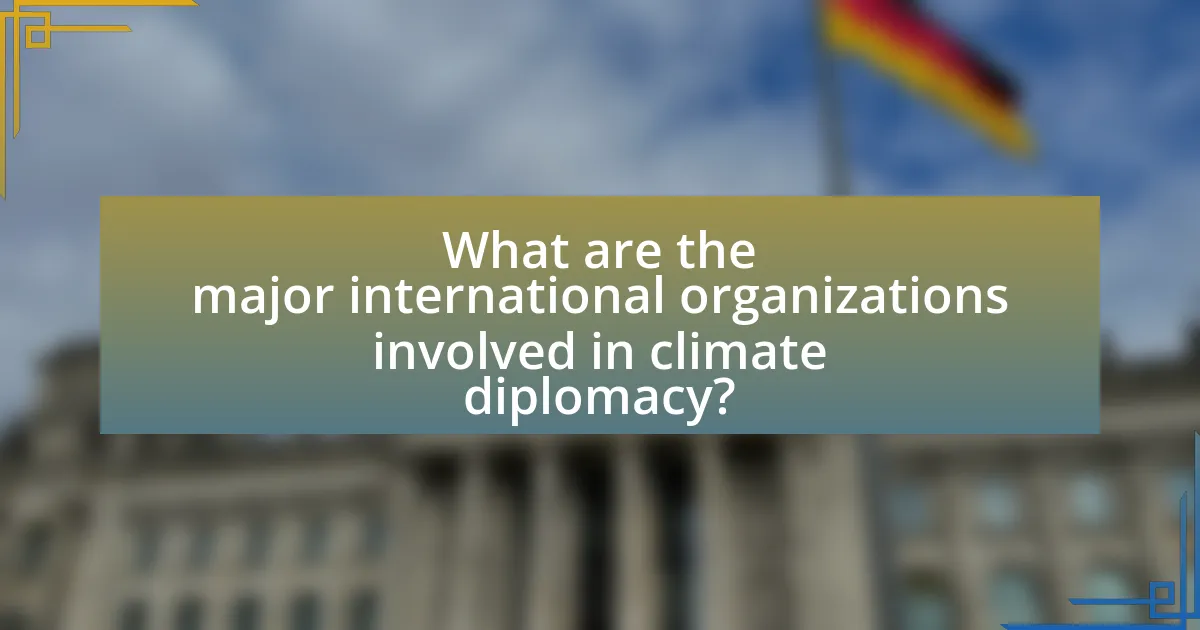
What are the major international organizations involved in climate diplomacy?
The major international organizations involved in climate diplomacy include the United Nations Framework Convention on Climate Change (UNFCCC), the Intergovernmental Panel on Climate Change (IPCC), and the World Bank. The UNFCCC, established in 1992, serves as the primary international treaty for addressing climate change, facilitating negotiations among countries to reduce greenhouse gas emissions. The IPCC, created in 1988, provides scientific assessments on climate change, influencing policy decisions globally. The World Bank plays a crucial role in financing climate-related projects and initiatives, supporting developing countries in their efforts to combat climate change. These organizations collectively shape global climate policy and foster international cooperation.
How does the United Nations contribute to climate diplomacy?
The United Nations contributes to climate diplomacy by facilitating international negotiations and agreements aimed at addressing climate change. Through frameworks such as the United Nations Framework Convention on Climate Change (UNFCCC), the UN provides a platform for countries to collaborate on climate action, exemplified by the Paris Agreement, which was adopted in 2015 to limit global warming to well below 2 degrees Celsius. The UN also organizes annual Conferences of the Parties (COP) to assess progress and enhance commitments, thereby promoting accountability among nations. Additionally, the UN supports developing countries through financial and technical assistance, enabling them to implement climate strategies effectively.
What specific initiatives has the UN launched for climate action?
The United Nations has launched several specific initiatives for climate action, including the Paris Agreement, the UN Climate Change Conference (COP), and the 2030 Agenda for Sustainable Development. The Paris Agreement, adopted in 2015, aims to limit global warming to well below 2 degrees Celsius above pre-industrial levels, with countries committing to nationally determined contributions (NDCs) to reduce greenhouse gas emissions. The UN Climate Change Conference, held annually, serves as a platform for countries to negotiate and enhance their climate commitments. Additionally, the 2030 Agenda for Sustainable Development includes Goal 13, which specifically addresses climate action, urging countries to take urgent action to combat climate change and its impacts. These initiatives collectively demonstrate the UN’s commitment to fostering international cooperation and accountability in addressing climate change.
How does the UNFCCC function within the climate diplomacy framework?
The UNFCCC functions as the primary international framework for climate diplomacy by facilitating negotiations among countries to address climate change. Established in 1992, it provides a platform for parties to discuss and implement measures aimed at reducing greenhouse gas emissions and adapting to climate impacts. The annual Conference of the Parties (COP) meetings serve as key events where nations negotiate binding agreements, such as the Paris Agreement in 2015, which aims to limit global warming to well below 2 degrees Celsius. The UNFCCC also supports capacity-building and financial mechanisms to assist developing countries in their climate efforts, reinforcing its role as a central actor in global climate governance.
What role do regional organizations play in climate diplomacy?
Regional organizations play a crucial role in climate diplomacy by facilitating cooperation among member states to address climate change challenges. These organizations, such as the European Union and the African Union, create platforms for dialogue, negotiation, and the implementation of climate policies tailored to regional needs. For instance, the European Union has established binding climate targets and emissions trading systems that influence member states’ policies, demonstrating effective regional governance in climate action. Additionally, regional organizations often mobilize financial resources and technical assistance to support climate initiatives, enhancing the capacity of their members to meet international climate commitments.
How do organizations like the European Union address climate change?
Organizations like the European Union address climate change through comprehensive policy frameworks and international agreements aimed at reducing greenhouse gas emissions. The EU has implemented the European Green Deal, which sets a target to achieve climate neutrality by 2050, and has committed to reducing emissions by at least 55% by 2030 compared to 1990 levels. Additionally, the EU plays a significant role in global climate negotiations, such as the Paris Agreement, where it advocates for ambitious climate action and provides financial support to developing countries for climate adaptation and mitigation efforts. These initiatives demonstrate the EU’s commitment to leading global efforts in combating climate change and fostering international cooperation.
What are the impacts of regional agreements on global climate efforts?
Regional agreements significantly enhance global climate efforts by fostering cooperation among nations, setting specific targets, and facilitating the sharing of resources and technology. For instance, the European Union’s Emissions Trading System has successfully reduced greenhouse gas emissions by approximately 35% since 1990, demonstrating the effectiveness of regional frameworks in achieving climate goals. Additionally, regional agreements often serve as testing grounds for innovative policies that can be scaled up globally, as seen with the Regional Greenhouse Gas Initiative in the Northeastern United States, which has influenced broader climate strategies. These agreements also encourage participation from countries that may be hesitant to engage in global treaties, thereby expanding the overall commitment to climate action.
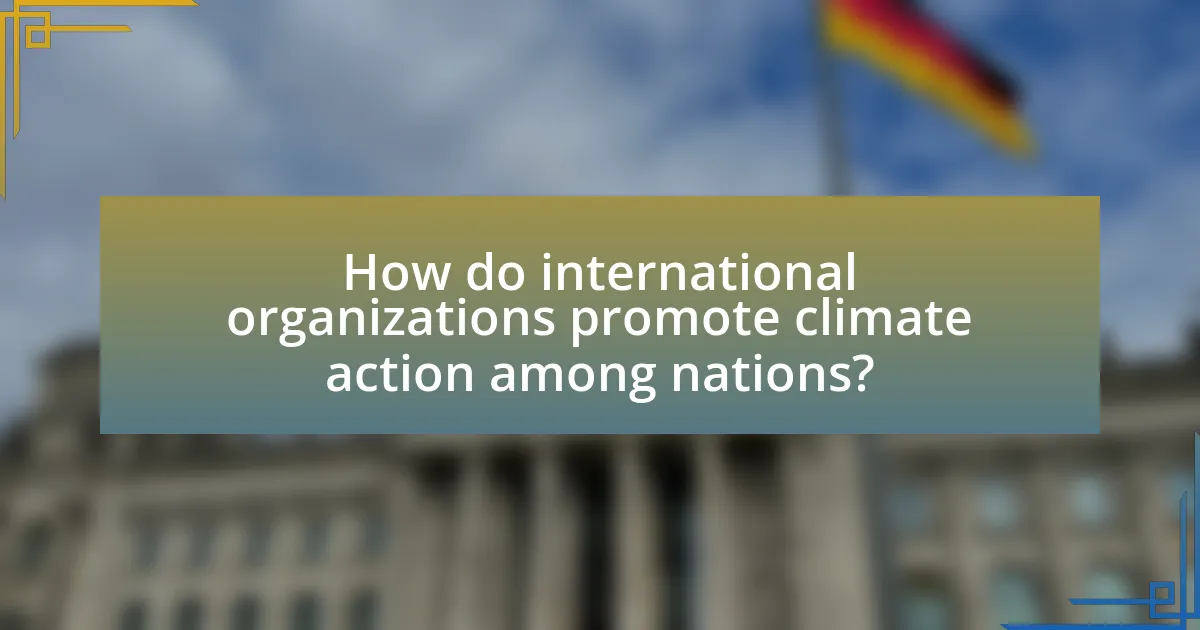
How do international organizations promote climate action among nations?
International organizations promote climate action among nations by facilitating cooperation, setting binding agreements, and providing financial and technical support. For instance, the United Nations Framework Convention on Climate Change (UNFCCC) organizes annual conferences, such as the Conference of the Parties (COP), where countries negotiate commitments to reduce greenhouse gas emissions. Additionally, organizations like the World Bank and the Global Environment Facility offer funding for climate-related projects, enabling developing nations to implement sustainable practices. These efforts are supported by scientific assessments from the Intergovernmental Panel on Climate Change (IPCC), which provide evidence-based recommendations that guide policy decisions.
What mechanisms do these organizations use to encourage compliance?
International organizations use regulatory frameworks, financial incentives, and capacity-building initiatives to encourage compliance with climate agreements. Regulatory frameworks, such as the Paris Agreement, establish binding commitments for countries, promoting accountability through reporting and transparency mechanisms. Financial incentives, including grants and loans from entities like the Green Climate Fund, support developing nations in meeting their climate goals, thereby fostering compliance. Capacity-building initiatives, often facilitated by organizations like the United Nations Framework Convention on Climate Change (UNFCCC), provide technical assistance and training to enhance countries’ abilities to implement climate policies effectively. These mechanisms collectively create a structured environment that motivates nations to adhere to their climate commitments.
How do funding and resources from international organizations support climate initiatives?
Funding and resources from international organizations support climate initiatives by providing financial assistance, technical expertise, and capacity-building programs. For instance, the Green Climate Fund, established by the United Nations Framework Convention on Climate Change, has committed over $10 billion to support projects aimed at reducing greenhouse gas emissions and enhancing climate resilience in developing countries. This funding enables nations to implement sustainable practices, develop renewable energy sources, and adapt to climate impacts, thereby facilitating global efforts to combat climate change.
What role does capacity building play in their strategies?
Capacity building is essential in the strategies of international organizations involved in climate diplomacy as it enhances the capabilities of nations to effectively address climate change challenges. By providing training, resources, and technical assistance, these organizations empower countries to develop and implement sustainable policies and practices. For instance, the United Nations Framework Convention on Climate Change (UNFCCC) facilitates capacity-building initiatives that help developing countries meet their climate commitments, evidenced by the establishment of the Capacity-Building Initiative for Transparency, which supports nations in improving their reporting and accountability mechanisms. This approach not only strengthens national capacities but also fosters international cooperation and knowledge sharing, ultimately leading to more effective climate action.
How do international organizations engage with non-state actors in climate diplomacy?
International organizations engage with non-state actors in climate diplomacy through partnerships, consultations, and collaborative initiatives. These organizations, such as the United Nations Framework Convention on Climate Change (UNFCCC), actively involve non-state actors, including NGOs, businesses, and local communities, in policy-making processes and negotiations. For instance, the UNFCCC has established mechanisms like the Local Communities and Indigenous Peoples Platform to ensure that diverse voices contribute to climate action discussions. This engagement is crucial as it enhances the legitimacy and effectiveness of climate policies by incorporating a wide range of perspectives and expertise.
What partnerships do they form with NGOs and the private sector?
International organizations form partnerships with NGOs and the private sector to enhance climate action and policy implementation. These collaborations often involve joint initiatives aimed at sustainable development, resource mobilization, and capacity building. For instance, the United Nations Framework Convention on Climate Change (UNFCCC) collaborates with various NGOs to facilitate stakeholder engagement and promote climate awareness. Additionally, partnerships with private sector entities, such as corporations committed to sustainability, enable the sharing of technology and innovation, which is crucial for achieving climate goals. These partnerships are essential for leveraging diverse expertise and resources, ultimately driving effective climate diplomacy.
How do these collaborations enhance climate action effectiveness?
Collaborations among international organizations enhance climate action effectiveness by facilitating coordinated efforts, sharing resources, and leveraging diverse expertise. For instance, partnerships like the United Nations Framework Convention on Climate Change (UNFCCC) bring together countries to align their climate policies, resulting in more comprehensive and unified approaches to emissions reduction. Additionally, these collaborations enable the pooling of financial resources, as seen in initiatives like the Green Climate Fund, which supports developing nations in implementing climate projects. This collective action not only amplifies the impact of individual efforts but also fosters accountability and transparency among nations, leading to more ambitious climate commitments and measurable outcomes.
What best practices can international organizations adopt for effective climate diplomacy?
International organizations can adopt several best practices for effective climate diplomacy, including fostering inclusive dialogue, leveraging scientific expertise, and promoting transparency. Inclusive dialogue ensures that diverse stakeholders, including governments, NGOs, and local communities, are engaged in the decision-making process, which enhances legitimacy and buy-in for climate initiatives. Leveraging scientific expertise allows organizations to base their strategies on robust data and research, facilitating informed policy-making. Promoting transparency in negotiations and reporting builds trust among parties and encourages accountability, which is crucial for long-term cooperation. These practices are supported by the findings of the Intergovernmental Panel on Climate Change, which emphasizes the importance of stakeholder engagement and evidence-based approaches in addressing climate change effectively.
How can international organizations improve their negotiation strategies?
International organizations can improve their negotiation strategies by adopting a multi-stakeholder approach that includes diverse perspectives and expertise. This strategy enhances the understanding of complex issues, as seen in the Paris Agreement negotiations, where input from various sectors, including civil society and the private sector, was crucial in reaching consensus. Additionally, utilizing data-driven decision-making can strengthen their positions; for instance, organizations like the Intergovernmental Panel on Climate Change (IPCC) provide scientific assessments that inform negotiations and build credibility. Furthermore, training negotiators in cultural competency and conflict resolution can lead to more effective communication and collaboration among parties, as demonstrated by successful outcomes in previous climate summits.
What lessons can be learned from successful climate diplomacy efforts?
Successful climate diplomacy efforts demonstrate the importance of multilateral cooperation and inclusive dialogue among nations. These efforts highlight that effective climate agreements, such as the Paris Agreement, rely on the commitment of diverse stakeholders, including governments, NGOs, and the private sector, to achieve common goals. For instance, the Paris Agreement, adopted in 2015, brought together 196 countries to collectively limit global warming, showcasing how shared objectives can mobilize international action. Additionally, successful climate diplomacy emphasizes the need for transparency and accountability, as seen in the regular reporting mechanisms established to track progress on emissions reductions. This approach fosters trust among nations and encourages compliance with climate commitments.



